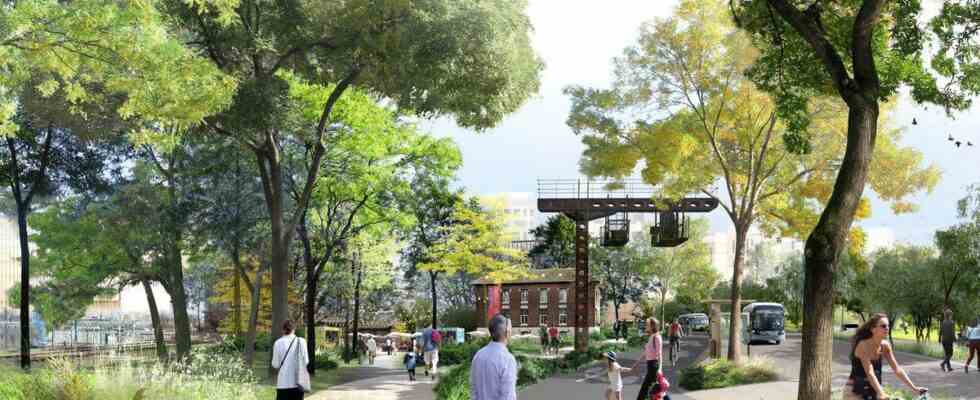This is the big deal that occupies Emmanuel Grégoire, the first deputy mayor of Paris. The revision of the Local Urbanism Plan (PLU) started in January 2021 should end at the end of 2023, beginning of 2024. As a reminder, the PLU enacts the rules of urban planning and land use in a given territory, here the surface of Paris. It is therefore an important document that the town hall of Paris has decided to rename PLU bioclimatic and which serves as a framework for all the urban development projects of the municipality.
For the executive in place, the PLU must meet three objectives. “How to transform the city to adapt it to 2050 when, for example, summer heat waves will be more frequent, how to guarantee that everyone can live in Paris, in particular through access to housing, and finally how to transform the city while preserving its urban identity and its heritage,” says Emmanuel Grégoire’s cabinet. Vast project in which Parisians are therefore invited to participate since Monday and for a period of 60 days via an online consultation.
Quite general and rather consensual questions
So this is not the first public consultation, it is even the third of the four provided for by law in the event of a revision of the PLU. The first took place in early 2021 and the second from January 21 to April 1, 2021 and focused on the planning and sustainable development project (PADD). This sub-document of the PLU makes it possible to set the main guidelines for long-term urban planning. With this consultation, we go into detail. “It’s the PLU at the bottom of your house”, as the office of the first deputy says.
Concretely on the Paris Idées site, the consultation is organized around 4 tabs: “Key actions of the preliminary draft”, “localized prescriptions”, “Sectoral OAPs” and “players’ notebooks”. In the first, we are invited to respond, from very favorable to very unfavorable, to various proposals related to concrete translations of the PADD and possibly leave comments. To better form its opinion, it is possible to download the preliminary draft, but the document is still 120 pages. The questions remain quite general and rather consensual. For example, this one: “Increase the number of protected green spaces (trees, green spaces…)”. Except renaud, rare are those who refuse the planting of trees… Or even this one: “Identify new places for public facilities and urban logistics”. Yes why not ?
In the “localized prescriptions” tab, you have access to an interactive map where you can suggest preserving a particular green space or reserving a particular plot for housing. Then, we have to deal with OAPs, or Sectoral Planning and Programming Orientations. To put it simply, the OAPs define a set of rules, either by theme (biodiversity, construction, etc.) or by sector. In the third tab, it is the latter in question. There are 13 in all that cover major urban development projects such as the Bercy-Charenton ZAC. Finally, the “actors’ notebooks” are reserved for contributions from recognized organisations.
“A local communication plan”
Obviously, among the citizens solicited, some are more committed than others, such as those who gravitate within the #Saccage Paris movement. “We will make a contribution, says the internet user behind the PanamePropre Twitter account, at the origin of the hashtag dreaded by the town hall of Paris. It is important to contribute, in particular to confront the municipal majority with these contradictions. ” The activist denounces ” a local plan of com ‘” and a ” form of schizophrenia “: ” The town hall announces that it wants to reduce the permeability of the soil, but at the same time makes the Triangle Tower! “But not wishing to be reduced to a role of critic, he promises” a political contribution, but also an in-depth study “. On the side of Emmanuel Grégoire’s cabinet, there is no fear of an influx of very critical contributions: “In public meetings too, there are hostile elements. And sometimes, with #SaccageParis, we say the same thing, from these contributions can emerge common subjects. »
On the side of environmental associations, we are on our guard. “We are going to participate and we invite the greatest number of people to do so, indicates Pierre-Alexis Hulin, of Friends of the Earth. But there is nothing very substantial. We still don’t have the real text of the PADD. We lack the regulations and especially the exceptions. This is also the limit of the exercise. For the contributor, it is difficult, on the website, to know if his proposal respects the PADD, a sine qua non condition for it to be retained, indicates the municipality. A number of contributions therefore risk ending up in the trash… Finally Frédéric Leonhardt, vice-president of Respire, asks, in parallel with the start of the PLU, “to stop the urbanization machine” because “there are too many gaps between statements and what is being done, especially on environmental health. »

